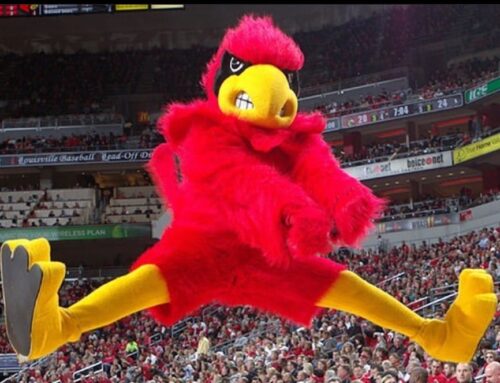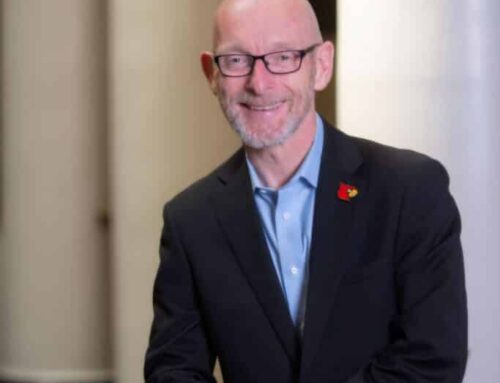By Joey Yazell–
With its 37th showing of Charles Dickens’ “A Christmas Carol,” Actors Theatre welcomes back Director Drew Fracher for his second time directing the play and William McNulty for his 11th time playing Scrooge. This play tells the classic tale of Ebenezer Scrooge and Tiny Tim with many attributes that will have you thinking about the true meaning of Christmas. Actors Theatre will open its doors on Dec. 6 for the opening night of a Christmas carol and will play through December 23 of 2012.
Q: How has playing Scrooge now for your 11th time changed since 1981?
A: Well the difference now is that I am old enough to play Scrooge, (laughs), so there is a lot less make up to put on. I think at the time I was far too concerned with making a caricature rather than a character. I was too concerned about what the audience’s expectations for comedy would be. So I think that it was a fair performance, but I can’t remember for sure. It leaned heavily toward comedy, now it is much less so. That’s a way to interpret the character; it’s a way to interpret the story. You can do it with Mr. McGoo. You can have Mr. McGoo play Scrooge, you can do it with Muppets. There is enough content there and can take it very seriously and play it from the heart. I try to create a believable character that the audience can not only understand, but also identify with.
Q: You have played Scrooge 11 times and now hold the record for playing this character so many times. Is this nationally or just locally?
A: Oh I hold the Record! I suppose that I do, yes. (Laughs) I really haven’t checked this nationally I have a friend up in Milwaukie, James Bickering, that I went to grad school with and I know he’s played it quite a few times but I don’t know the exact number. But I am probably up there in the top 3 or 4 guys.
People who play Scrooge tend to play this roll over and over again. Everything about the show becomes traditionalized. Once you start producing it in a community it rapidly becomes a tradition. A lot of people don’t want their traditions to change very much (laughs) they want the same ornaments on the tree, same yard decorations, and the same Scrooge. In a way it is good for me, it ensures me work!
Q: So what does it take for you to become Scrooge? How do you make yourself become the infamous grumpy Scrooge? What are your preparations?
A: Well I could get into a lot of fancy discussions on acting techniques, I could tell you that there are lots of things in this world to be angry and grumpy about, so if the actor doesn’t normally hate Christmas the actor will substitute something else in. He might think of something he does hate and adopt that attitude.
But actually I read the story and I think about how I would be if I were born into those circumstances. There is also another great acting teacher that talks about the magic “If.” “If” I were born into Scrooge’s circumstances, if I had grown up the way Scrooge grew up, and there is a lot of detail in the play. And if you read the story, this wasn’t a guy who was born a grouch, he was born a miser. He had some very difficult experiences that scared him as a kid. He became terrified of poverty. So it wasn’t like it is now, there wasn’t the social safety net then that there is now. You were sent to a work house if you were poor and couldn’t pay your bills. It was horrible, poverty was horrible! There wasn’t a lot of help, and once you were plunged into it, it was very difficult to claw your way out. That’s what planted the seed in him, this most monstrous figure he is when we meet him at the beginning of the play. He builds a wall of wealth around him to protect himself from the world, he doesn’t even enjoy his money, he doesn’t indulge in fancy clothing or nice restaurants or anything. It’s about fear. Once you think about the details of that particular life that you’re trying to bring to the stage, then it’s not so difficult to walk out there and make belief.

A: I think that we all can agree that Christmas has become an engine of the economy. That Christmas has become a commercial event as much as a spiritual event or anything other than that. This story is a way to get back in touch with the true meaning of the holiday. I think it means similar things to people who aren’t even Christians. I don’t mean to take the Christ out of Christmas, I think Christians are entitled to lay claim to the holiday. But it has become secularized; the sentiment has also become secularized, the sentiment of compassion, the sentiment of generosity. I think the story annually reminds me of all of those things that connect us as humans, connect me to this community, to family, to friends; it’s a reminder for me. The best part of it is being able to be a part of a process of reminding others about the essence of Christmas, it’s not about going to the mall, it’s not about jingle bells particularly, or lawn decorations, there is something more and deeper there that should be acknowledged. I play this roll with enormous sincerity or try to play it with enormous sincerity. Every night, every show my heart gets broken; every show my heart gets opened up. If I am doing it right, the audience will identify with that and have the same experience.
Q: You directed and acted in Dracula and also wrote the adaptation. Have you helped or participated in directing this show with Drew Fracher?
A: Any rehearsal process is a process of collaboration between the director and the actors, if the director has any sense at all and if the actors are good. Most certainly the director has the last word and sets the concept and sets the tone and the pace and the dynamics, but there is a lot of room for the actor to get his own interpretation acknowledged. The actor has to bring his own ideas to the work; he or she has to bring their own interpretations to the work. There is always a lot of give and take with me and fortunately Drew is my favorite director that I have ever worked with on this show. We see eye to eye, we are the generation that regards theatre as story telling which may sound obvious, but believe me, there are lots of directors who don’t get that, who think it’s more about spectacle, and eccentric choices about visual content. Those things are certainly important. Like in a Christmas Carol the spectacle aspect of it is important, we have lots of songs and dances that are just terrific to watch but if they are not integrated with the story. Or if the story does not advance during them, then it gets lost. It’s easy for that to happen when there is so much music and that much spectacle going on. We both have been very concerned with keeping the audience up with this characters amazing journey through this dark night of the soul that he goes on. For these past two years it’s been really great collaborative process with this guy.
Q: Is it hard for you to work under another director? Considering you are a director yourself.
A: Not at all (laughs) I am very happy to have someone else do all that work. Acting is easier than directing. You don’t have to worry about all of the design concepts, the lighting the sound, that’s all taken care of by somebody else. Although when I do direct I find the challenge very stimulating.
[email protected]
Photos courtesy Alan Simmons/Actors Theater of Louisville






